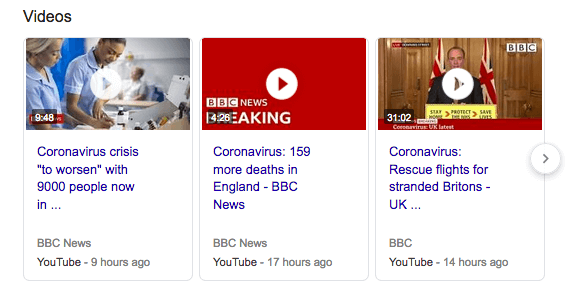By and large, whichever search engine you use, you will find what you’re looking for on most occasions. There are, however, small reasons you notice every now and again that remind you why most of us use Google.
One thing that all search engines have changed in recent years is the way they display results. Once just a long page of text, a search today might return snippets at the top of the page, information panels, news stories, frequently asked questions and videos. These all help to enrich our searching experience, provided they are accurate and relevant.
I’ve noticed, however, that Bing can be somewhat off the pace here compared to Google, particularly with regards to videos. For example, here’s what I got for a Bing search for ‘BBC news’ on Tuesday morning.
The first of the three videos is about the coronavirus death toll rising above 400. With the rate at which the virus is accelerating, one would be forgiven for thinking this is the daily number of UK deaths. However, closer inspection reveals that it’s a video from the BBC about the GLOBAL death toll reaching 427. It’s from February 4th – nearly two months ago.
The other two video suggestions are similarly out of date, with one concerning the first coronavirus death outside of China, and another about a shooting from February 3rd.
Amid this rapidly developing pandemic, to present information this far behind the times is not only useless, it’s misleading and, though I hesitate to use the term, bordering on “fake news”. Very poor from Bing, compared to Google’s much more up-to-date video suggestions for the same search.
Of course, anything else in the news at present is a very distant second to the virus, but there have also been some stories about the Royals of late, so what does Bing suggest video-wise if we search for ‘royal family’?
Here we have three videos from a YouTubing couple using the account name ‘Royal Family’. The channel is quite popular, boasting more than 2.5 million subscribers, but even so, isn’t it more likely that we’re looking for the British monarchy? Google seems to think so.
It’s telling that even a search for ‘Bing’ on Bing returns two videos about how to disable Bing on Windows 10 – not the best piece of self-publicity on the main search page!
It makes me think that Bing is not putting a lot of thought into video search, which is surprising when talks we’ve heard from Microsoft representatives, at such events as the now defunct SAScon, have centred on the idea of Bing being a more visual and intuitive search engine than Google.
Bing remains the second biggest English language search engine behind Google and is the default choice for all Microsoft devices and applications, as well as some iPhones. Its algorithms are also used by the fast-growing environmentally friendly search engine Ecosia.
However, the most recent statistics show that Bing still only accounts for 11.58% of global search engine use, compared to Google’s 73.05%, and as we’ve seen, it can be erratic. That’s why at Engage Web, we concentrate our search engine optimisation efforts on Google, although it does no harm to keep an eye on its rivals.
- How to find a circular reference on Excel - May 23, 2024
- Five life skills learned from internet marketing - January 3, 2024
- How artificial intelligence can (and can’t) help you write content - September 29, 2023








